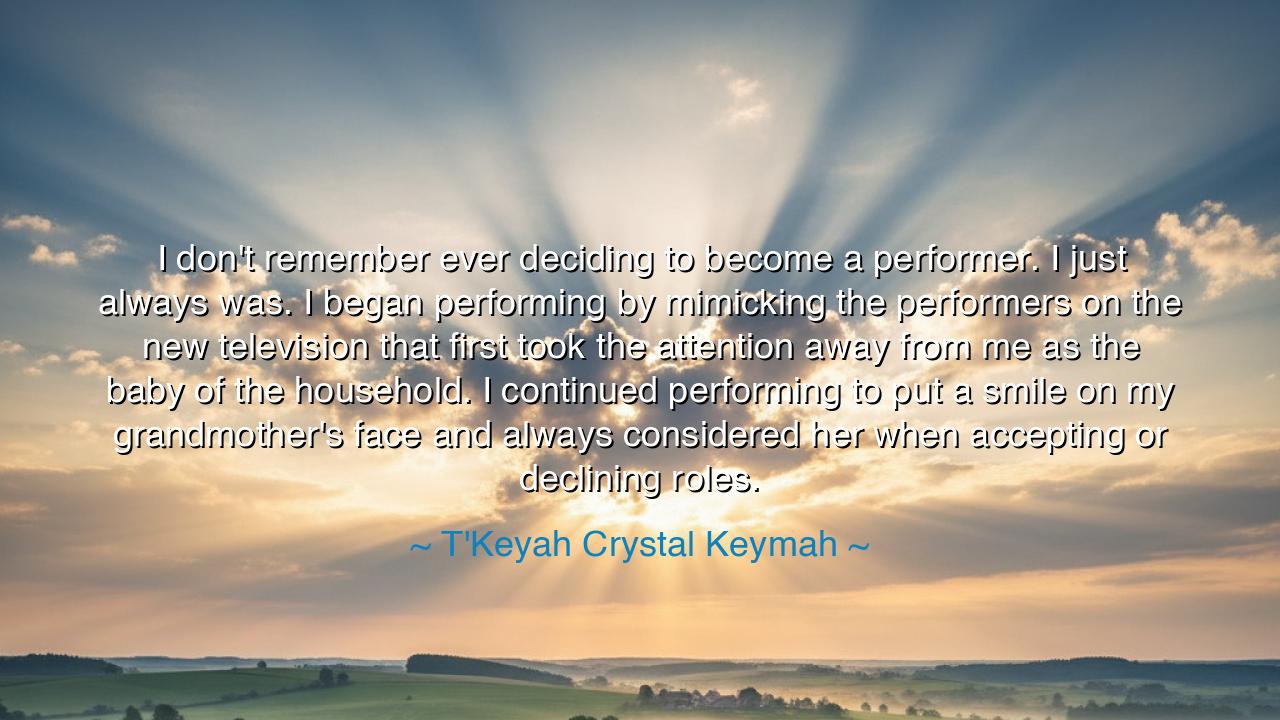
I don't remember ever deciding to become a performer. I just
I don't remember ever deciding to become a performer. I just always was. I began performing by mimicking the performers on the new television that first took the attention away from me as the baby of the household. I continued performing to put a smile on my grandmother's face and always considered her when accepting or declining roles.






Hear the words of T’Keyah Crystal Keymah: “I don’t remember ever deciding to become a performer. I just always was. I began performing by mimicking the performers on the new television that first took the attention away from me as the baby of the household. I continued performing to put a smile on my grandmother’s face and always considered her when accepting or declining roles.” Within these words, we hear the timeless truth that calling is often not chosen, but born. It rises unbidden from the depths of the soul, a natural expression of being, as inevitable as breath itself. For Keymah, the path of the performer was not forged by decision, but revealed by instinct, by love, and by the longing to bring forth joy.
The ancients, too, spoke of such destinies. The poet Hesiod declared that the Muses place their song within chosen hearts, not by reasoned choice but by divine gift. The child who begins to sing before speech, or to dance before learning steps, carries within them a spark that cannot be extinguished. Keymah’s mimicry of television performers, born of a desire to reclaim attention, blossomed into artistry. What began as play became purpose, as though the gods themselves had whispered: “This is who you are.”
But her words reveal something deeper still: the sacred bond of art and love. For she tells us she performed not for the stage, nor for fame, but first and foremost to put a smile on her grandmother’s face. This is the root of true artistry—not the hunger for applause, but the yearning to brighten the heart of another. Just as ancient bards sang not only to immortalize kings but also to bring comfort to hearth and hall, so Keymah shaped her path around the light in her grandmother’s eyes. The smile of one soul became the compass for her choices.
History offers us many such examples. Think of Mozart as a boy, playing not only for royalty but to delight his father, Leopold, who guided him through both tenderness and severity. The young composer’s earliest offerings were not to nations, but to family. So too did Keymah measure her life’s work not solely by prestige, but by the standard of love—asking with each role whether it would honor the spirit of her grandmother who first inspired her. In this way, her art became a lineage, a legacy shaped not just by talent, but by devotion.
There is also humility in her reflection. To say, “I just always was” is to acknowledge that the seed was planted before she could name it, that performance was as natural to her as breathing. In an age where many claim their art through ambition, she reminds us that some are simply born into it. And yet, though born with the gift, she did not wield it selfishly. She bound it to love, to responsibility, to a reverence for family and for joy. This is the mark of wisdom: to turn gift into service, to make talent a vessel for light.
The lesson for us is clear: when you discover the gift that feels as natural as your own heartbeat, honor it, but do not use it only for yourself. Anchor it in love. Ask, as Keymah did, not only “What role can I play?” but “Whose smile will this bring? Whose life will this enlighten?” Let your work—whether art, craft, or service—be guided by devotion to something greater than self. In this way, your gift will not fade, for it will be rooted in something eternal.
So let this wisdom endure: the truest callings are not chosen, but revealed. Cherish them, nurture them, and offer them in love. Perform, sing, work, or labor not only for applause, but for the smile of those who matter most. For in the end, the measure of a life is not the size of its stage, but the warmth it brings to the hearts of others. And that is a legacy stronger than fame—a legacy worthy of the ancients.






AAdministratorAdministrator
Welcome, honored guests. Please leave a comment, we will respond soon